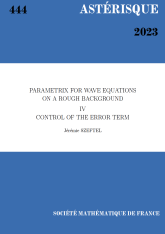L'indice des familles projectives d'opérateurs elliptiques : le cas décomposable
The index of projective families of elliptic operators : the decomposable case
- Consulter un extrait
- Année : 2009
- Tome : 328
- Format : Électronique
- Langue de l'ouvrage :
Anglais - Class. Math. : 19K56, 58G10, 58G12, 58J20, 58J22
- Pages : 255-296
- DOI : 10.24033/ast.872
Une théorie de l'indice pour des familles projectives d'opérateurs pseudodifférentiels elliptiques est développée sous les deux conditions suivantes : la e de Dixmier-Douady est dans $\operatorname {H}^2(X;\mathbb {Z} )\cup \operatorname {H}^1(X;\mathbb {Z} )\subset \operatorname {H}^3(X;\mathbb {Z} )$, et la partie de degré deux est trivialisée sur l'espace total de la fibration. Le fibré d'Azumaya correspondant peut alors être raffiné en un fibré d'opérateurs régularisants. Les indices topologiques et analytiques d'une famille projective d'opérateurs elliptiques associée au fibré d'Azumaya lisse sont à valeurs dans la $K$-théorie tordue de la base de la famille et le résultat principal est l'égalité de ces deux indices. Le caractère de Chern tordu de la famille est calculé par une variante de la théorie de Chern-Weil.


